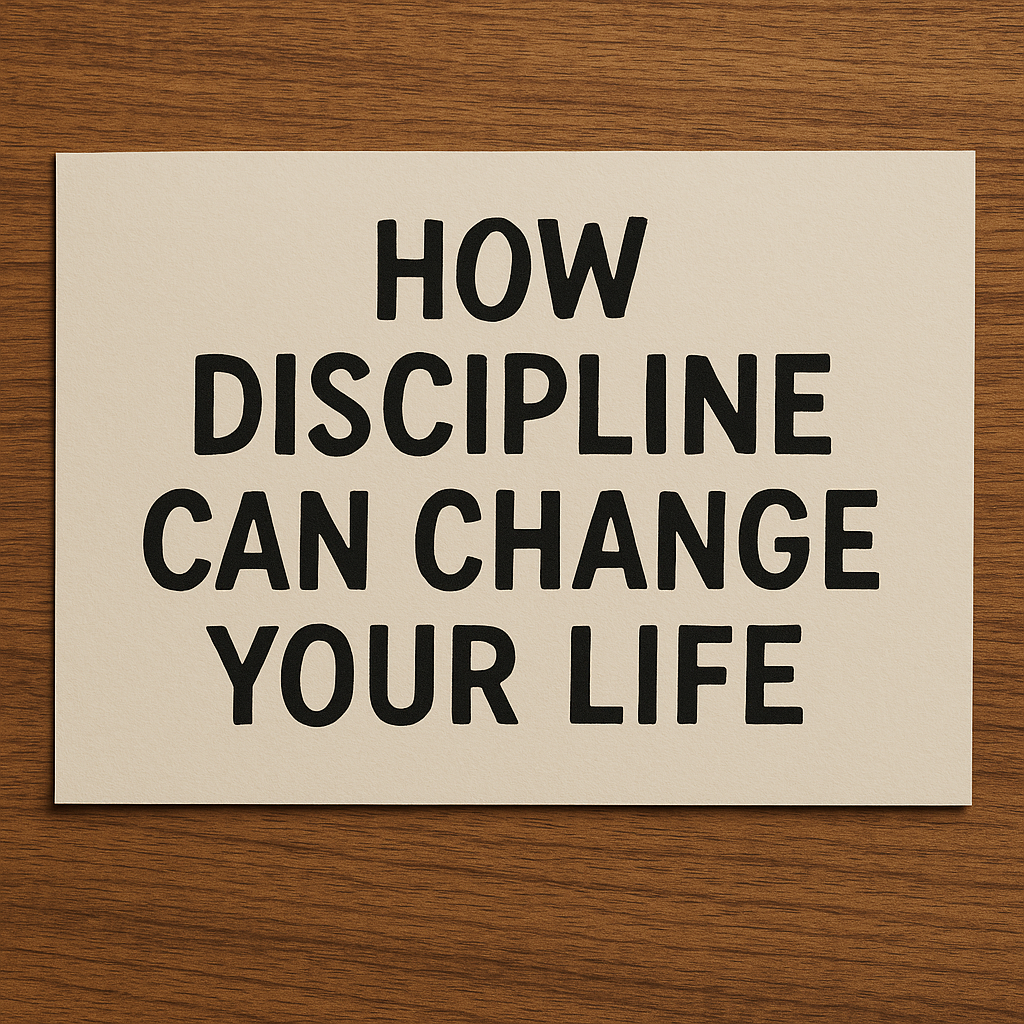Discipline is often misunderstood as something restrictive or rigid. But in reality, it is one of the most powerful tools you can use to shape your life, achieve your goals, and unlock your full potential. Discipline is not about punishment—it’s about control, consistency, and commitment.
What Is Discipline, Really?
Discipline is the ability to control your impulses, emotions, and behaviors to achieve long-term goals. It is about making decisions that align with your values and priorities—even when you don’t feel like it. In essence, discipline is doing what needs to be done, even when it’s hard.
There are two primary types of discipline:
- Self-discipline: Internally driven; your personal willpower and motivation.
- External discipline: Externally enforced by others, such as parents, teachers, or bosses.
For long-term life transformation, self-discipline is key.
Why Discipline Matters More Than Motivation
Motivation is temporary—it comes and goes. One day, you feel unstoppable. The next, you might feel completely drained. Relying solely on motivation is risky because it fluctuates. Discipline, on the other hand, is consistent.
Think of discipline as the engine that keeps you moving even when motivation is low. It’s the structure that carries you forward when inspiration disappears.
“Motivation gets you started. Discipline keeps you going.”
Real-Life Benefits of Discipline
Discipline doesn’t just make you productive. It can create a ripple effect that improves every area of your life. Here’s how:
1. Better Health
People who practice discipline often:
- Eat healthier
- Exercise regularly
- Get enough sleep
Why? Because they’re able to resist short-term pleasures (junk food, skipping workouts, staying up late) in favor of long-term well-being.
2. Stronger Finances
Discipline helps you:
- Create and stick to a budget
- Save money consistently
- Avoid impulsive spending
This leads to financial freedom and less stress about money.
3. Improved Relationships
Being disciplined in communication—listening, being present, choosing your words carefully—helps build stronger relationships. It also means you show up when you say you will and follow through on commitments.
4. Increased Productivity
Disciplined individuals can:
- Prioritize tasks
- Avoid procrastination
- Stay focused for longer periods
This leads to better results in school, work, and personal projects.
5. More Confidence
When you consistently keep promises to yourself, your self-respect grows. You begin to believe in your ability to follow through, which boosts your confidence.
How to Build Discipline: Practical Strategies
Becoming disciplined is like building muscle—it takes time, effort, and consistency. Here are some effective ways to develop discipline:
1. Start Small and Stay Consistent
Don’t try to change your entire life overnight. Instead, start with small habits. For example:
- Wake up 10 minutes earlier
- Drink more water each day
- Read for 5 minutes every night
As these habits become easier, you can build on them.
2. Set Clear, Achievable Goals
Vague goals like “get fit” or “be productive” aren’t helpful. Instead:
- Set specific goals: “Go to the gym 3 times a week” or “Write 500 words per day.”
- Track your progress to stay motivated.
3. Create Routines
Discipline thrives in structure. A routine removes the need to make decisions all the time. For example:
- Morning routine: meditation, workout, breakfast
- Work routine: check emails, deep work, short breaks
Over time, routines become automatic and easier to maintain.
4. Eliminate Distractions
Identify what’s pulling your attention away. Common distractions include:
- Social media
- Excessive notifications
- Cluttered environments
Reduce or remove these distractions to help you stay focused.
5. Use the “5-Minute Rule”
When you feel resistance to doing something, commit to doing it for just 5 minutes. Often, the hardest part is starting. Once you begin, it becomes easier to keep going.
6. Reward Progress, Not Perfection
It’s okay to mess up. What matters is getting back on track. Reward yourself for sticking with your goals—even if the progress is small.
7. Stay Accountable
Tell someone about your goals. Join a group or partner with a friend who’s on a similar path. Accountability increases commitment.
What Happens When You Lack Discipline?
Without discipline, life often feels chaotic. You might:
- Constantly miss deadlines
- Struggle with unhealthy habits
- Feel overwhelmed or stagnant
- Let opportunities pass you by
While it’s normal to struggle sometimes, living without any structure or self-control can prevent you from reaching your full potential.
Discipline Is a Form of Self-Love
Choosing discipline is choosing a better future. It’s an act of self-respect and belief in your own potential. Every time you wake up early, skip an unhealthy snack, or finish a task you didn’t want to do—you’re saying, “I matter. My future matters.”
The Life-Changing Power of Discipline
If you want to change your life, discipline is the foundation. It’s not about being perfect or never making mistakes. It’s about building the strength to make good decisions—even when it’s hard, even when no one is watching.
Over time, disciplined actions add up. They compound. What starts as a small habit can turn into a transformed life.
